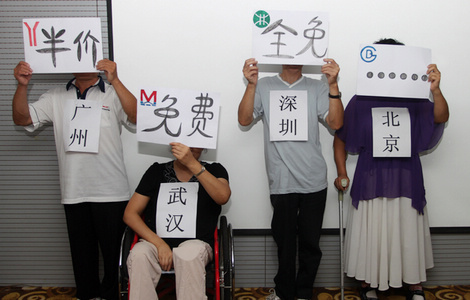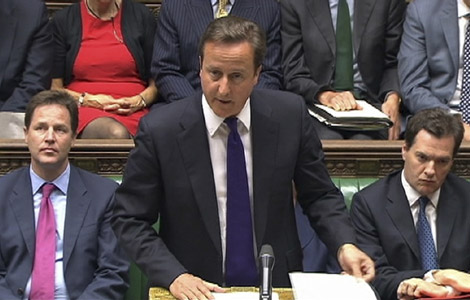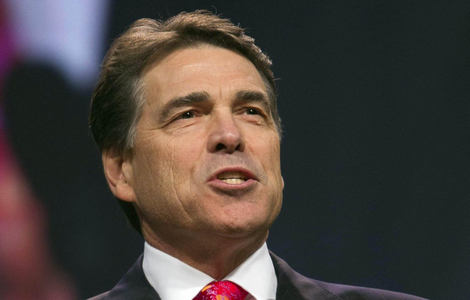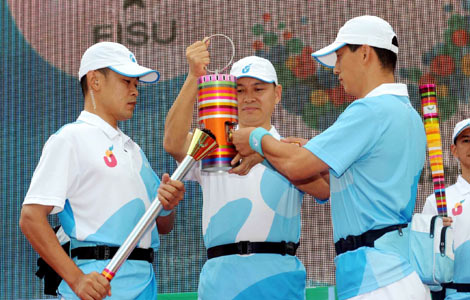China's future aircraft carrier no source of tension
Updated: 2011-08-12 08:34
(Xinhua)
|
|||||||||||
BEIJING - Chinese and American military experts have said that China's future aircraft carrier is not a source of tension for the United States and other nations in the Asia-Pacific region.
About two weeks after China's Ministry of National Defense confirmed its program to refurbish an ex-Soviet aircraft carrier, the still unfinished vessel commenced its maiden sea trial on Wednesday morning from Dalian of northeast Liaoning Province where the carrier was docked.
While some neighboring countries have expressed concern over the growth of the People's Liberation Army (PLA) Navy, such as Japan's most recent defense white paper, Peter Singer, a senior fellow in foreign policy at the Washington-based Brookings Institution, told Xinhua that he didn't believe the Chinese carrier was a source that could worsen the current situation in the Asia-Pacific region.
"One should not be surprised that China, whose military and economic power has grown immensely over the last decades, would want to join the 'carrier club' along with states like the US, UK, Brazil, India, France," Singer said in an email.
It's an understandable ambition from a strategic and national prestige standpoint for China to develop aircraft carrier, he said.
Currently, the United States, the United Kingdom, France, Russia, Spain, Italy, India, Brazil and Thailand, operate a total of 21 active-service aircraft carriers.
Japan's Maritime Self-Defense Force currently has two 18,000-metric ton Hyuga-class helicopter carriers, although the warships are classified by Japan as "helicopter destroyers."
Once the still-unnamed carrier is delivered to the PLA Navy, China will be the last among the permanent members of the UN Security Council to possess an aircraft carrier.
The Asia-Pacific is also an area where aircraft carriers frequently cruise. The nuclear-powered supercarrier USS George Washington has been forward deployed at Japan's Yokosuka, and other US carriers visit the area from time to time for military exercises, deterrence, as well as port calls and humanitarian aids.
"I don't think the carrier itself is a source of tension with the US," Singer said. "I think the greater sources of regional tension remain the behavior and unresolved maritime claims."
According to Singer, such sources include the conduct of the navies in the South China Sea and sea disputes between China and some of its neighboring states.
China signed an agreement with members of the Association of Southeast Asian Nations (ASEAN) in 2002 at Cambodian capital Phnom Penh, which seeks regional stability by resolving disputes in the South China Sea in a peaceful way.
The agreement, Declaration on the Conduct of Parties in the South China Sea, asked all concerned countries to maintain self-restraint and not to conduct activities that would complicate or escalate disputes such as inhabiting the uninhabited islands and reefs.
"Tensions between Japan, the Philippines or Vietnam were there before the carrier," Singer said, noting that China's neighboring countries may look at the carrier with some apprehension, but none should blame the carrier for tensions in the South China Sea.
Chinese military scholars told Xinhua that China's carrier program was for the sake of its own maritime interests.
"China's future aircraft carrier would only add stable factors to the Asia-Pacific region and the world peace," said Cao Weidong, a researcher of the PLA Navy's Academic Research Institute.
"Compared with the US and other carrier-savvy navies, China is just a beginner in operating an aircraft carrier," Cao said.
To fuel its fast growing economy, China is increasingly reliant on natural resources imported through maritime transport routes from overseas.
The PLA Navy has deployed its task forces in rotation since the end of 2008 to the Gulf of Aden and waters off the coast of Somalia to escort Chinese and foreign merchant vessels transiting.
"We have learned from the escort missions and other operations, such as evacuating citizens from Libya, that an aircraft carrier is something that the navy needs," Cao said, adding that the weapon platform will also be a necessary tool for the country to safeguard territorial waters and maritime transport routes.
Related Stories
Maiden run for aircraft carrier 2011-08-11 10:22
China's carrier not alter power balance:Russian expert 2011-08-11 09:06
Carrier will not change defensive policies 2011-08-10 16:39
No need to be unsettled over China's 1st carrier 2011-08-10 14:48
China's refitted aircraft carrier starts sea trial 2011-08-10 07:58
Hot Topics
Anti-Gay, Giant Panda, Subway, High Speed Train, Coal Mine, High Temperature, Rainstorm, Sino-US, Oil Spill, Zhu Min
Editor's Picks

|

|

|

|

|

|







